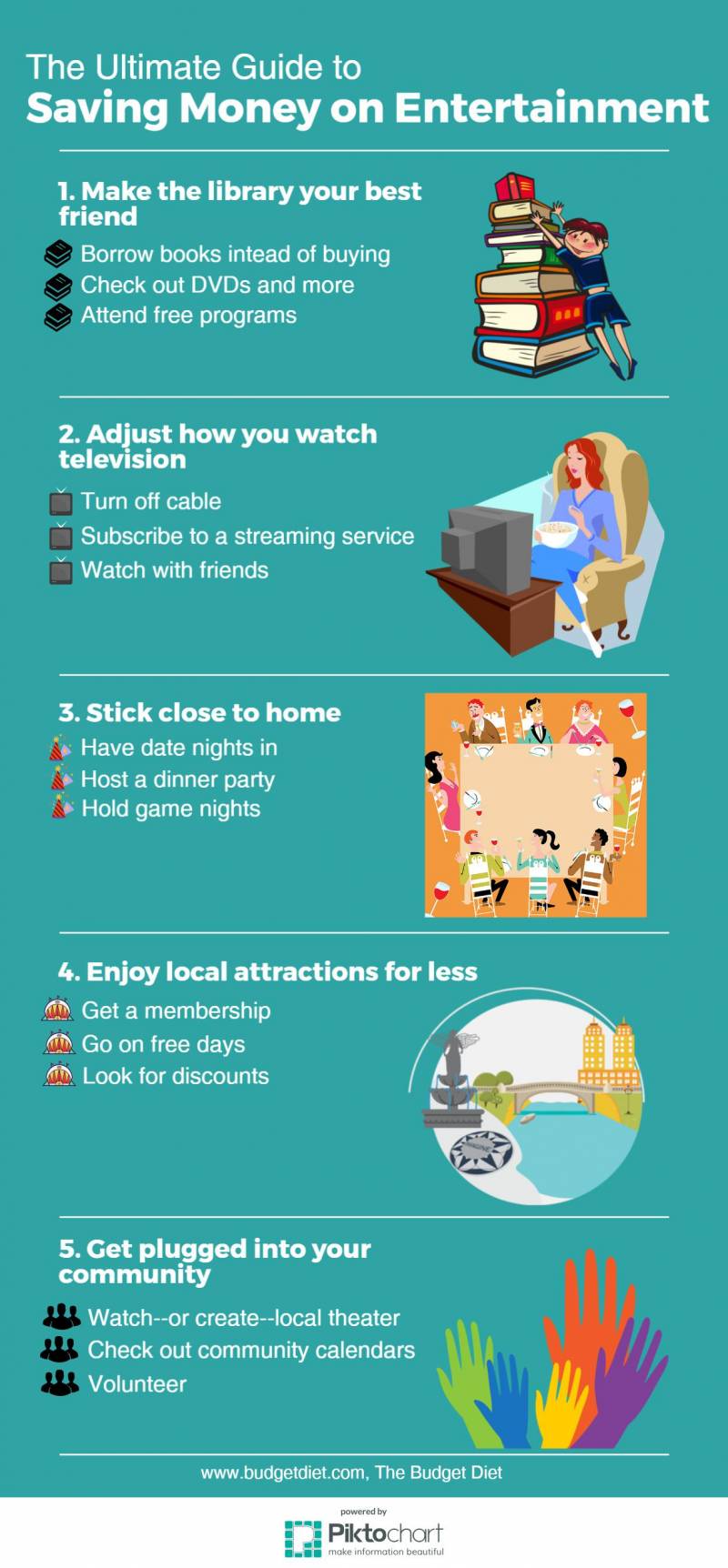 The entertainment category of my personal budget is pretty small. Some might call it tiny. In fact, less than 1 percent of my family's take-home pay is dedicated to entertainment. However, we certainly don't sit at home in boredom all of the time.
The entertainment category of my personal budget is pretty small. Some might call it tiny. In fact, less than 1 percent of my family's take-home pay is dedicated to entertainment. However, we certainly don't sit at home in boredom all of the time.
Instead, we're pretty good at staying busy on the cheap. We've learned that recreation doesn't have to be expensive, and we seek out ways to have fun without spending big bucks.
Could your entertainment budget use some trimming? If you're ready to start spending less on leisure activities, read this ultimate guide to saving money on entertainment.
-
-
Make the Library Your Best Friend

Image source: www.libraryaware.com Think the library is just shelf after shelf of musty old books? Think again! Your local library can be the ticket to all sorts of entertainment on the cheap. It starts with books, but it sure doesn't end there.
Borrow Books Instead of Buying
Done right, reading can keep you cheaply occupied for hours. However, if you purchase books, their costs can quickly add up. Even digital books are expensive; surprisingly, their price can actually exceed that of printed ones.
Thankfully, through the library, you can read book after book for free or almost free. Some libraries charge an annual fee if you live out of city limits, but if you're an avid reader, you'll quickly get your money's worth out of this cost.
At most libraries, you will even have access to brand-new books and best sellers. If there's a popular one you want to read, put your name on the waiting list, and they'll let you know when it becomes available. If your local branch doesn't have the book you want, they may be able to get it for you through an inter-library loan program. And some libraries even have the capability of letting you check out digital books for your e-reader.
Check Out DVDs and More
Most libraries have so much more to offer than just books. Although availability varies, yours probably has movies, CDs and audiobooks that you can check out to enjoy at home. Some also have videos games or children's activity packs.
In fact, more and more libraries are offering free streaming of movies and albums. At your branch, you may be able to borrow these digital media in a similar fashion to how you can check out digital books, or your library may offer the option to check out a streaming device that will plug into your t.v. set.
Attend Free Programs
Many local libraries maintain a full calendar of events for their patrons. Most offer programs for all ages, including adults, and classes and events are usually free or low-cost.
At the library, you may find book clubs and other special-interest groups. Author visits and other guest speakers are popular library programs. Other events may give you the opportunity to learn new skills, such as how to make a craft or how to navigate technology. If you take advantage of all of the programs that your library has to offer, you may soon find that your entertainment calendar is fully booked!
If you have kids or teens, the library is a great place to find entertaining activities for them, too. Yours may present story hours or show movies on a big screen. Their activity lineup might include STEM classes, building block clubs or art sessions. Summer reading programs are annual traditions for many libraries; these keep children busy and help maintain or improve their reading skills during school breaks.
-
Adjust How You Watch Television

Image source: media.beam.usnews.com Staying home to watch TV seems like a cheap form of entertainment, but how much are you paying for that privilege? Rethink how you watch television, and there's a good chance that you can save some serious cash.
Turn Off Cable
Americans' cable television bills have risen to over $100 per month on average. A cable bill that size adds up to well over $1,000 per year!
A Neilsen survey revealed that Americans watch about 4.5 hours of live t.v. each day and about half an hour of DVRed content. If you are in the camp that gets five or more hours of entertainment a day from your cable or satellite service, it can be tough to imagine breaking up with your plan.
However, the thought of trimming $100 or more from your household budget each month may provide the motivation that you need. That's a major reason why many people have been cutting t.v. plans in recent years. In the second quarter of 2016 alone, about 800,000 Americans dropped their plans.
Subscribe to a Streaming Service
Fortunately, ditching cable or satellite t.v. doesn't have to mean tossing your television set out the window. With the abundance of streaming services on the market today, you can watch some of your favorite shows for far less than the cost of your current bill.
In fact, you may even be able to catch some shows for free. Setting up an HD antenna is a one-time purchase that will give you the option to watch live network t.v., especially if you live in an urban area.
Some networks offer free streaming of their programs. You will probably have to wait for a day or two after the air date to view the episode online, but it's hard to beat free t.v. shows that you can watch at your convenience. One other caveat: This is only a reasonable option if your internet service is fast enough to accommodate streaming.
If those free options don't provide enough program variety for you, consider paying a little each month for access to more shows. Hulu and Netflix are two of the big players in this market, and each has a reasonably low per-month fee. Streaming is also one of the perks of an Amazon Prime membership; an annual subscription offers the best deal on this service, and college students can qualify for a discounted rate.
For a middle ground between Netflix-style streaming and traditional cable, try a live streaming service. YouTube TV, for example, costs about one-third of the amount of the average cable bill and provides access to a cloud-based DVR and live network television programming.
Watch with Friends
What do you do if there's a big event you want to watch on t.v., but you've cut out cable? First of all, if you have an antenna or a live streaming service, you may still be able to catch many of these events on your television.
If not, don't despair. Hopefully, you have friends who haven't yet ditched their cable service and will let you come over to watch. To sweeten the deal for your friends, offer to bring snacks or drinks.
No dice on that? Try a local sports bar or restaurant instead. If the game or event is a big deal, some establishment in your area is bound to be showing it. Just keep in mind that you'll be expected to order food or drinks while you're there.
If there is a pay-per-view option for the event you want to watch, get together with friends for the viewing. Everyone can chip in toward the cost.
-
Stick Close to Home

One of the easiest ways to save money is to just stay home. Almost everything is cheaper at home than it is when you go out. You can really save on food and movies, in particular, when you enjoy them from the comfort of your own house.
Have Date Nights In
Who says that you have to go somewhere to enjoy a date with your special someone? If you can manage to minimize distractions, you can have a perfectly romantic date at home. Put the kids to bed, leave your smartphones in the other room, turn up the mood music and get set to enjoy each other's company.
Renting a movie and popping a bag of popcorn makes for an extremely cheap and easy date, but don't limit yourself to this standby time and again. Instead, challenge yourselves to try new at-home date ideas. Make a special dinner together, learn to dance with online tutorials, take turns giving massages or stargaze in the backyard. Hop over to Apartment Therapy for even more stay-at-home date suggestions, such as holding your own beer tasting.
Host a Dinner Party
When friends get together, it's often to go out to eat. What if, instead, you invited your friends over for dinner at your house? For one thing, a home-cooked meal is almost always significantly cheaper than a restaurant one. You may be able to feed all of your guests for less than one person's restaurant meal would cost. Ask your friends to provide a bottle of wine, and you're all set.
Besides, when you get together in your home, time constraints are lessened. No waiter will be rushing you out the door in order to clear the table for his next party, and you can linger over conversation before serving the dessert. In fact, if you go out, you and your friends might feel compelled to go to the movie theater after dinner just to fill the entire evening; such an add-on only increases the cost of your night out. After a dinner at home, you and your guests have the freedom to pass the rest of the evening by watching a movie on t.v., playing a round of cards or simply chatting in comfortable chairs.
Hold Game Nights
Board games nights are another way to entertain friends in your home. This can be even cheaper than a dinner get-together because you don't necessarily need to serve a full meal. Ask everyone to bring a snack or drink, and your group will have plenty to munch on all night long.
If you already have a few good board games, there won't be too many costs involved with planning a game night. For the times when you need to buy a new game, see if you can find a secondhand copy. Just be sure that it includes all of the pieces! You can also ask your friends to bring their favorite games.
One more idea: You'll have to leave home for this one, but if your friends aren't too into games or you're looking to expand your social circle, consider participating in free game nights at local stores or restaurants.
-
Enjoy Local Attractions for Less

Image source: www.asiatours.de Vacations can offer amazing entertainment, but they can also be quite expensive. The average American vacation costs over $1,100 per person. Fortunately, you may be able to enjoy some of the activities that you'd do on a vacation, such as visiting zoos, museums or amusement parks, without leaving your local area. If you can save money on those nearby attractions, that's even better!
Get a Membership
If there's an attraction that you would like to visit regularly, do the math to figure out whether buying a membership would pay off. If you plan to go repeatedly, there's a good chance that a membership is the way to go. In fact, some memberships pay for themselves in as little as two visits. The fine print varies between institutions but the membership perks may include unlimited admission, guest passes, and discounts on food, souvenirs or special programs.
Even better, many memberships, especially to cultural institutions like zoos, science centers and children's museums, may open up even more free admission opportunities to you. Many organizations have reciprocal agreements with other similar institutions, so a membership to one allows you free or discounted admission to the others. Read the fine print carefully, as there may be exclusions about free admission to institutions in your immediate area. However, if you don't mind driving a bit, one membership can provide a whole slew of low-cost entertainment opportunities.
Go on Free Days
Some zoos, museums and nature centers are always free. If you live near one of those, lucky you! If the ones near you require paid admission and a membership isn't for you, see if they ever offer free entry. Some museums hold free days or free evenings as often as once a month.
Smithsonian magazine sponsors an annual Museum Day Live. On their website, you can request free tickets to one of the hundreds of participating institutions.
Bank of America and Merrill Lynch cardholders can take advantage of the Museums on Us program. On select days, cardholders are granted free admission for one to certain cultural institutions.
The Every Kid in a Park program grants free entrance to National Parks and some other recreational sites. The vouchers are available to fourth-grade students and their families.
Look for Discounts
No matter how hard you try to score free admission, some places just don't offer that deal. Fortunately, you may still be able to find discounts for those spots.
Coupons are one of the most popular ways to score a reduced price. Check an attraction's website for coupons, or search deal sites like Groupon for an bargain on ticket vouchers. Other options include checking newspapers and magazines for coupons or signing up for an attraction's email list. Six Flags theme parks even put promo codes on soda cans during the summer months.
If you are attending a show, find out whether you can get a discount for going early. Plays and movie theaters often have a matinee rate that is a few dollars less than the evening shows.
Another way to get ticket deals is to get a group of friends to go with you. Often, when you have a group of just 10 or more people, the attraction will offer you a group admission rate. This can be a useful trick for circuses, museums, theater performances and more.
-
Get Plugged Into Your Community

Image source: cdn-images-1.medium.com The more involved you are in your community, the fuller your life will be. If it's entertainment that you're after, there's a good chance that you can find it in your own backyard.
Watch–or Create–Local Theater
The average cost of a ticket to a Broadway performance is over $100. Unless you live near New York City, you also have to factor in the cost of traveling the Big Apple to see one of these shows. Catching a touring performance may reduce your travel costs, but those tickets can still run $50 or more.
Despite the price, if you're a theater buff, it's hard to beat the entertainment value of a live show. But instead of blowing your hard-earned cash on Broadway tickets, maintain your passion for the stage by attending performances at a community theater. The production value probably can't match Broadway caliber, but you may be pleasantly surprised at just how well done the shows are. Plus, you may be able to score a full season pass for the cost of a single Broadway ticket.
Even better, get involved in the show! Auditioning for an on-stage role is one way to join in an upcoming play, but you may also be able to volunteer as a stagehand, a ticket-taker or a musician. Attending rehearsals and putting on shows will keep you entertained for many evenings. You'll meet new friends and have a hand in providing local entertainment for others in your community.
Check Out Community Calendars
In your area, there are probably multiple organizations that maintain community calendars to help residents learn about local events. Often, the activities listed on these calendars are free or low-cost. In fact, some community calendars have rules against for-profit groups using their platform as a form of advertising.
If you can find multiple community calendars in your area, it can be a smart idea to review all of them on a regular basis since they might list different activities. For easy access, most organizations post their calendars online. Check the websites of city governments, radio stations, television stations, newspapers, and universities.
Parks and recreation departments and community college extension offices often put out their own schedules for the adult education programs that they sponsor. Have you ever wanted to learn a foreign language, begin a painting hobby, try out ballroom dancing or become a cooking master? Community education classes can be the ticket to developing these skills, and the costs are often quite reasonable.
Volunteer
One of the very best ways to keep occupied is by sharing your time with those in need. This approach to entertainment doesn't just keep you busy; it also helps you lead a fulfilling life. Surveys have shown that volunteers feel healthier, happier, and less stressed. In fact, 94 percent of survey participants reported that lending a hand perks up their mood. Filling your time with volunteer work is entertainment with a purpose.
For the best volunteering experience, choose a role that matches both your interests and skills. By helping out a cause that you're passionate about, you'll feel a personal connection to the work you are doing. Finding a volunteer spot that calls on your strengths will help you feel useful and confident about your role with the organization. Once you identify a place where you could potentially fill a need, present yourself to the group's leadership, and inquire about their volunteer sign-up process.
Before you know it, you may find yourself regularly involved with a meaningful community organization. Whether you decide to coach youth sports, prepare meals at a soup kitchen or walk dogs at an animal shelter, you'll have the opportunity to meet new people while making a difference.
-
Has this list given you some new ideas for saving money on entertainment? Keeping our recreation budget in check helps my family free up more money for necessities, savings and giving to worthy causes. 



